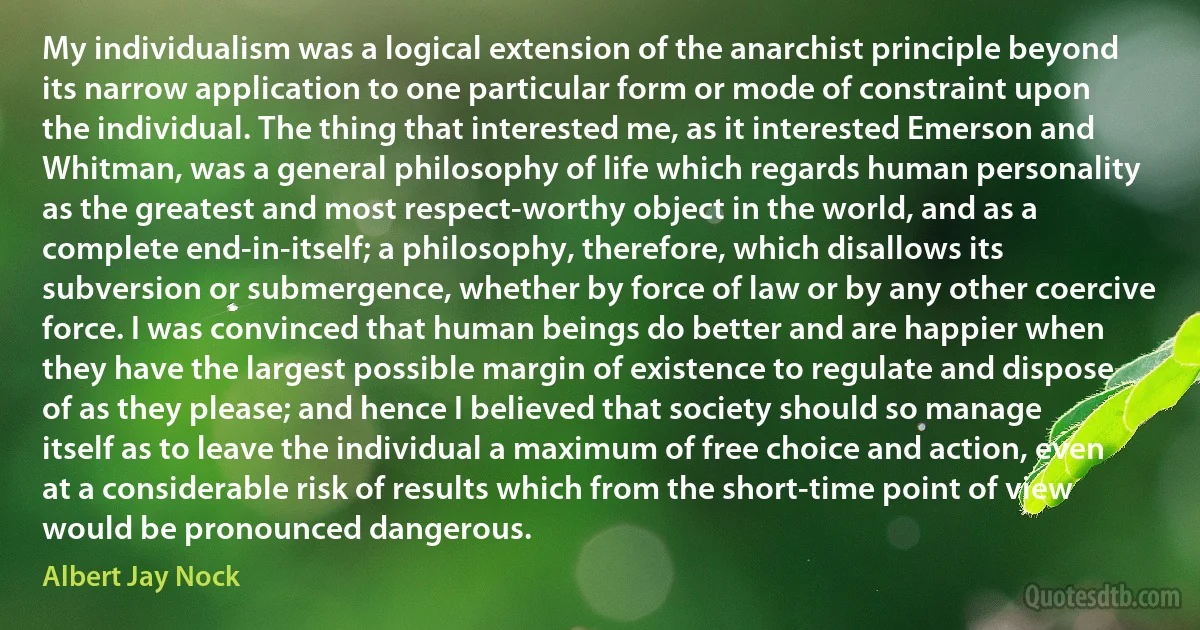
My individualism was a logical extension of the anarchist principle beyond its narrow application to one particular form or mode of constraint upon the individual. The thing that interested me, as it interested Emerson and Whitman, was a general philosophy of life which regards human personality as the greatest and most respect-worthy object in the world, and as a complete end-in-itself; a philosophy, therefore, which disallows its subversion or submergence, whether by force of law or by any other coercive force. I was convinced that human beings do better and are happier when they have the largest possible margin of existence to regulate and dispose of as they please; and hence I believed that society should so manage itself as to leave the individual a maximum of free choice and action, even at a considerable risk of results which from the short-time point of view would be pronounced dangerous.
Albert Jay NockRelated topics
action anarchist beyond choice extension force form free general happy human individualism law leave life maximum narrow point possible risk should subversion thing view world emersonRelated quotes
Euclidean geometry can be easily visualized; this is the argument adduced for the unique position of Euclidean geometry in mathematics. It has been argued that mathematics is not only a science of implications but that it has to establish preference for one particular axiomatic system. Whereas physics bases this choice on observation and experimentation, i.e., on applicability to reality, mathematics bases it on visualization, the analogue to perception in a theoretical science. Accordingly, mathematicians may work with the non-Euclidean geometries, but in contrast to Euclidean geometry, which is said to be "intuitively understood," these systems consist of nothing but "logical relations" or "artificial manifolds". They belong to the field of analytic geometry, the study of manifolds and equations between variables, but not to geometry in the real sense which has a visual significance.

Hans Reichenbach
There seems to be a direct and formal design on foot, to enslave all America. This, however, must be done by degrees. The first step that is intended, seems to be an entire subversion of the whole system of our fathers, by the introduction of the canon and feudal law into America. The canon and feudal systems, though greatly mutilated in England, are not yet destroyed. Like the temples and palaces in which the great contrivers of them once worshipped and inhabited, they exist in ruins; and much of the domineering spirit of them still remains. The designs and labors of a certain society, to introduce the former of them into America, have been well exposed to the public by a writer of great abilities; and the further attempts to the same purpose, that may be made by that society, or by the ministry or parliament, I leave to the conjectures of the thoughtful.

John Adams
It is true that God is necessity, or, as we may also put it, that he is the absolute Thing: he is however no less the absolute Person. That he is the absolute Person however is a point which the philosophy of Spinoza never reached: and on that side it falls short of the true notion of God which forms the content of religious consciousness in Christianity. Spinoza was by descent a Jew; and it is upon the whole the Oriental way of seeing things, according to which the nature of the finite world seems frail and transient, that has found its intellectual expression in his system. This Oriental view of the unity of substance certainly gives the basis for all real further development. Still it is not the final idea. It is marked by the absence of the principle of the Western world, the principle of individuality, which first appeared under a philosophic shape, contemporaneously with Spinoza, in the Monadology of Leibnitz.

Baruch Spinoza
What is a public meeting? It is not an anarchical combination-it is not a mob-it is an assemblage of rational beings to which, if the invitation be general, every man has a right to go, and the Government reporter has a right to go, but only like others and subject to the ordinary law. But if instead of appealing to the promoters of the meeting...to afford the Government reporter facilities, if instead of that the method of violence is resorted to, then I say the law was broken by the agents of the law. It is idle to speak to the Irish people of the duty of obeying the law, or to bring in Coercion Bills to make them obey the law, if the very Government that so speaks and that brings in these Bills has agents who violate the law by violently breaking up orderly public meetings, and who are sustained by the Ministers of the Crown in this illegal action.

William Ewart Gladstone
Unfortunately... the philosophy of Aristotle laid it down as a principle, that the celestial motions were regulated by laws proper to themselves, and bearing no affinity to those which prevail on earth. By thus drawing a broad and impassable line of separation between celestial and terrestrial mechanics, it placed the former altogether out of the pale of experimental research, while it at the same time impeded the progress of the latter by the assumption of principles respecting natural and unnatural motions, hastily adopted from the most superficial and cursory and remark, undeserving even the name of observation. Astronomy therefore continued for ages a science of mere record, in which theory had no part, except in so far as it attempted to conciliate the inequalities of the celestial motions with that assumed law of uniform circular revolution which was alone considered consistent with the perfection of the heavenly mechanism.

John Herschel
